Content
Deutsches Patentamt (1945-1998) bzw. Deutsches Patent- und Markenamt (seit 1998)
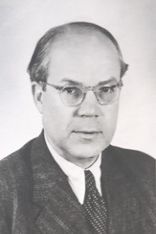
Prof. Dr. jur. Eduard Reimer
Term of office: 1. Oktober 1949 - 5. Juni 1957
The time without any Patent Office after the end of the Second World War lasted until 1 October 1949, when the German Patent Office (DPA) took up its work at a provisional office in the rooms of the Deutsches Museum in Munich. The first president was Eduard Reimer.
Reimer, born on 8 December 1896 in Berlin, had worked as a specialist for copyright and patent law in a Berlin law firm before the war. After the end of the war, he worked temporarily as a judge before resuming his legal practice and holding teaching posts at Berlin universities. As the founding President of the German Patent Office in 1949, he was initially superior to 423 employees. In 1954, he was already responsible for 1,809 employees.
Berlin wanted the Patent Office back, but because of the political situation in divided post-war Germany, Munich seemed to be the safer location for the West German federal authority. The Berlin office of the DPA moved into the premises of the former Reichspatentamt.
In 1953, only a few metres from the provisional office, construction work began on the new office building on Zweibrückenstraße in Munich, where the German Patent Office still has its headquarters today. Eduard Reimer, however, did not live to see its completion. The expert in intelellctual property protection, who was also highly respected internationally, died on 5 June 1957 during his speech at a trade mark conference in Nice.
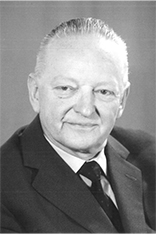
Dr. jur. h. c. Herbert Kühnemann
Term of office: 1. Oktober 1957 - 12. Dezember 1962
Reimer's successor was allowed to complete the move to the new building complex on Zweibrückenstraße in 1959. The 1,841 office employees now had 56,000 square metres of office space at their disposal. The President's office, which Kühnemann was the first to move into, is located in the connecting building between the tower-block and the so-called atrium building.
Herbert Kühnemann, born on 23 June 1899 in Berlin, worked as a judge before moving to the Reich Ministry of Justice in 1932, where he played a major role in the new laws on industrial property protection published in 1936. After his return from captivity as a POW, he became head of the Berlin office in 1950 and then succeeded Reimer until he, too, died while still in office on 12 December 1962.
During his term of office, the Federal Administrative Court rendered a landmark judgement that eventually led to the establishment of the Federal Patent Court in 1961.
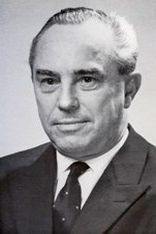
Dr. Kurt Haertel
Term of office: 1. Mai 1963 - 31. Dezember 1975
Kurt Werner Haertel determined the fate of the Patent Office longer than any of his predecessors. The number of employees at the DPA rose to a peak of over 2,500 in 1968 - by then the new building was already too small. The first computer systems and automatic typewriters entered the office during Haertel´s tenure.
Born on 26 September 1910 in Berlin, he studied law there and in Erlangen. After holding positions in business and a time as a prisoner of war, he temporarily became a judge, then an advisor in the "Central Office for Economics" of the British occupation zone in Minden. In 1948, Haertel began working in the legal office of the "United Economic Territory" as head of the "Industrial Property Protection" department, then he headed the department of the same name in the German Federal Ministry of Justice.
In these functions, and from 1963 as President of the Patent Office, he decisively shaped the modern IP system. He also played a decisive role in shaping the international treaties on IP protection, such as the European Patent Convention, which was signed at a conference in Munich on 5 October 1973. Haertel, who was honoured many times, was therefore later called the "father of European patent law". He died on 30 March 2000 in Seefeld am Ammersee.
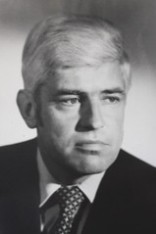
Dr. jur. Erich Häußer
Term of office: 1. Januar 1976 - 30. Juni 1995
Although he was one of the youngest presidents, Erich Otto Häußer already had an impressive career behind him when he took over as head of the Patent Office: he had worked in the Ministries of Justice in Munich and Bonn, was a judge at the Federal Patent Court and the Federal Supreme Court in Karlsruhe. At the age of 46, Häußer, who was born on 9 June 1930 in Markt Taschendorf, then followed in Kurt Haertel's big footsteps.
And he immediately had to fight: "These massive staff cuts lead to a considerable and hardly compensable burden, which could affect the functioning of the Patent Office in the long run," he warned in the 1978 annual report. Häußer carried out aggressive public relations work to fight against the job cuts at the Patent Office. He also used catchy slogans such as "Wer nicht erfindet, verschwindet. Wer nicht patentiert, verliert" (Whoever does not invent, disappears. Those who don't patent, lose.)
His long tenure was rich in epochal upheavals: in 1977, the European Patent Office (EPO) began its work right next to the German office. As a result, national patent applications temporarily dropped significantly and many an German examiner was lured to the EPO by the attractive salary.
In 1987, the first personal computers entered the office. After reunification in 1990, the GDR's "Office of Inventions and Patents" (AfEP) had to be dissolved and many of the approximately 600 employees and over 15 million patent documents integrated. In 1993, a small branch office of the DPA opened in Hauzenberg as a typing pool.
Despite everything, Häußer still found the time to teach as an honorary professor in China. After his tenure, he was a lecturer at the ETH Zurich, among others, until he died in Bad Tölz on 17 May 1999.
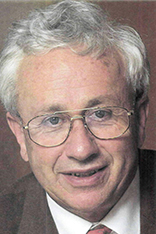
Dipl.-Ing. Norbert Haugg
Term of office: 1. August 1995 - 31. Januar 2000
Until then, the presidents of the Patent Office had almost exclusively been lawyers, but with Norbert Viktor Haugg, an engineer took over the reins of the office. Born in Lauingen on 26 January 1935, the mechanical engineer joined the Patent Office in 1967 after working in industry. He first was a patent examiner, then head of the Organisation and Planning Department, and later head of the Patents Department. In 1983, he moved to the Federal Patent Court, where he was appointed Vice President in 1991.
During his tenure, the Patent Office embarked on the path to digitalisation: in 1996, the Office's first website was launched. In 1999, the DEPATIS patent database was launched - initially with 25 million specifications. More than four million new documents are added every year. Today, about 142 million patent specifications from all over the world can be accessed online in DEPATISnet (as of January 2023).
On 1 September 1998, Haugg opened the new third office in Jena after the Independent Federalism Commission decided in May 1992 to relocate the Berlin office to Thuringia following the reunification of the two German states. About 200 staff members from the Berlin office moved to Thuringia. In addition, the name of the Office changed: since 1 November 1998 it has been called the German Patent and Trade Mark Office. This is to underline the growing importance of trade mark protection.
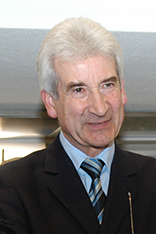
Dr. Hans-Georg Landfermann
Term of office: 1. Februar 2000 - 30. Juni 2001
Hans-Georg Landfermann, born in Erfurt in 1941, was a judge and employee of the Max Planck Institute for Comparative and International Private Law in Hamburg before joining the Federal Ministry of Justice in 1972. There he headed the Department for Trade Mark Law and Legal Issues of Unfair Competition from 1994 and the Subdepartment for Industrial Property, Copyright and Economic Administrative Law from 1998. At the same time, he lectured on insolvency law at the Universities of Strasbourg and Berlin (FU).
During his term of office, public access to the register data of the office was opened for the first time via the DPINFO information system (today: DPMAregister). Landfermann remained President of the DPMA for a little more than one year and was then appointed President of the Federal Patent Court (BPatG). In addition, he became special representative for issues relating to the future European patent jurisdiction. In 2006, he retired as President of the BPatG.
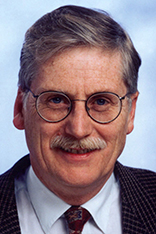
Dr. Jürgen Schade
Term of office: 1. August 2001 - 31. Dezember 2008
A paradigm shift had already begun under his predecessors, which Jürgen Schade resolutely continued: the transformation of the DPMA from a classical authority to a modern service provider.
Schade, born on 3 December 1942 in Berlin, also studied Protestant theology, but as a doctor of law he continued the long line of lawyers at the head of the DPMA. He was a research associate at the Max Planck Institute for Foreign and International Patent, Copyright and Competition Law before joining the Patent Office in 1977. He gained international experience in 1981/1982 during a secondment to the World Intellectual Property Organization in Geneva. He then served as a judge and later as presiding judge at the Federal Patent Court before returning to the DPMA as President in 2001. During his term of office, several events were held for the first time, such as the industry meeting (since 2014: DPMAnutzerforum) and the "Intellectual Property Talks", which expanded the DPMA's public relations work.
Schade also attached great importance to cooperation with the European and international partner offices. Among other things, he expanded the cooperation with the Chinese patent office and established new partnerships with India, Brazil, the United States and Japan. Internally, he ensured that home office working solutions were set up for the first time to promote the reconciliation of work and family life, as well as the crèche.
Schade was also active in local politics and, among other things, was a member of the Bavarian State Parliament from 1994 to 1998.
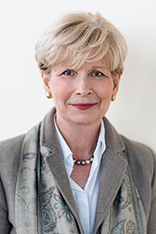
Cornelia Rudloff-Schäffer
Term of office: 1. Januar 2009 - 31. Januar 2023
The comprehensive digitisation of the DPMA's services was largely completed during Cornelia Rudloff-Schäffer's fourteen-year term of office. In 2011, she welcomed the introduction of the electronic case file for the completely digitised processing of patents and utility models as a "historic turning point for our office". In 2015, electronic file processing was also enabled for trade mark procedures. The electronic filing options for all IP rights procedures and digital services were continuously expanded. Accompanying these massive changes for staff and users through structured change management was a major concern for her.
Rudloff-Schäffer, born on 10 February 1957 in Bad Camberg, studied law, politics and journalism in Mainz, worked from 1984 to 1991 at the Max Planck Institute for Foreign and International Patent, Copyright and Competition Law (now MPI for Innovation and Competition) and at the Ludwig Maximilian University in Munich. In 1991, she moved to the Federal Ministry of Justice, where she last headed the Department for Trade Mark Law and the Law against Unfair Competition. In 2001, she joined the DPMA as Head of the Legal Division, where she became Head of the Department of Trade Marks, Utility Models and Designs in 2006.
As instruments of customer dialogue, the website of the office and the DPMAnutzerforum were completely redesigned in 2017; the DPMA User Advisory Council started its work for the first time in 2019. The introduction of e-billing (2018) also took place during her term of office: The DPMA was the first federal authority to launch electronic invoice processing. The structure and staffing of the large IT departments of the office were adapted to the requirements of the time, and public relations work was expanded to include digital services. With the "Global Patent Prosecution Highway", the international cooperation of the patent offices was further expanded for the benefit of patent applicants.
During the Covid 19 pandemic in the years 2020 to 2022, which also led to a boom in trade mark applications, the model of flexible workplace arrangements, which had been continuously expanded in the previous years, proved its worth. Thanks to the completely digitalised processing method and the immediately expanded home office options, the Office's operations could be maintained almost unaffected.
Rudloff-Schäffer is co-author of a standard commentary on patent law. The first woman to head the Patent Office was again able to hand over her office to a female successor, the lawyer Eva Schewior, at the beginning of 2023.
< Zurück

Last updated: 10 December 2025
Not only protecting innovations
Social Media